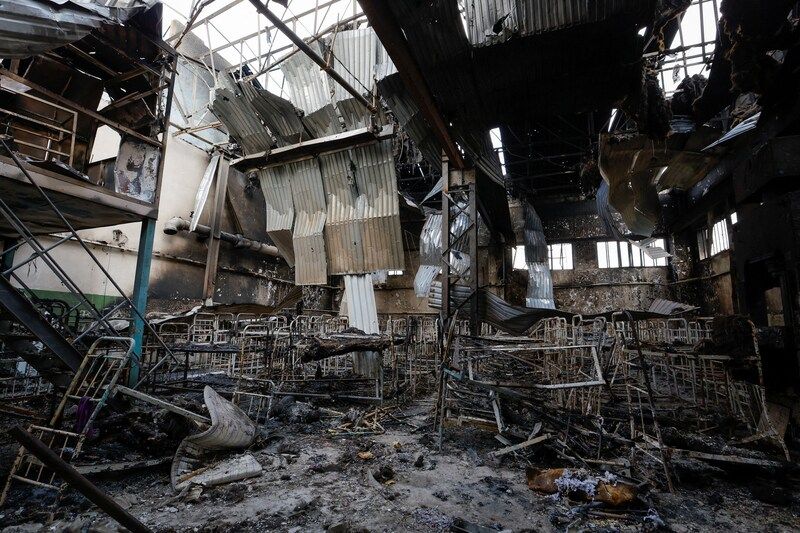
The moral relativism of self-consciously neutral journalism — “Jack says the moon is made of green cheese, Jill disagrees” — is bad enough when it comes to political reporting. It’s far more noxious in the case of war crimes. Yet many publications are reporting the sickening massacre of 53 Ukrainian prisoners of war on Friday with headlines like this one from The Post: “Ukraine and Russia trade blame for attack killing Mariupol prisoners”.
This might make sense for the Iran-Iraq war, but there is no moral equivalency between Ukraine and Russia. The Ukrainians are innocent victims of unprovoked aggression. They are not known to deliberately target civilians, much less their own captured soldiers. The Russians are notorious war criminals and liars who routinely blame someone else for every outrage they (or their allies) commit — including shooting down a Malaysian passenger jet over Ukraine in 2014 and slaughtering civilians in Bucha, Ukraine, this year.
It is, of course, possible that an errant Ukrainian artillery strike might have hit the prisoner-of-war camp near Olenivka, in eastern Ukraine. But the Ukrainians deny that they fired any artillery in the area on Friday, and the Russians aren’t claiming a “friendly fire” accident. Russian media claims that the Ukrainians deliberately slaughtered their own soldiers to discourage others from surrendering and to prevent these soldiers, who belonged to the Azov Regiment, from testifying about supposed Ukrainian war crimes.
As usual, Russian propaganda makes no sense. The Azov Regiment surrendered in Mariupol only after receiving orders to do so from Kyiv, and the only war crimes its members witnessed were committed by the Russians against the people of Mariupol. They are heroes in Ukraine, and governments — even governments far less democratic and law-abiding than the one in Kyiv — do not ordinarily kill their own heroes.
The Russians, by contrast, have plenty of reason to murder these soldiers, whose desperate resistance in the Azovstal steel plant cost the Russians dearly and prevented them from shifting forces to the east. The Russian Embassy in London actually tweeted on Friday: “Azov militants deserve execution … because they’re not real soldiers. They deserve a humiliating death”.
The way that Russians treat POWs was evident in a widely circulated video that appears to show a pro-Russian fighter castrating and executing a bound Ukrainian prisoner. The Russians — who have been accused of rape and sexual violence, in addition to killing and deporting countless Ukrainians — seem to be plumbing new depths of depravity in their genocidal war to eradicate the Ukrainian nation.
The invaders’ barbarism can seem atavistic and animalistic, and no doubt it is, but there is a certain logic to their cruelty. Because the Russian army lacks the requisite skill for maneuver warfare, it seeks to prevail by slaughtering civilians, instead. Russian dictator Vladimir Putin has used such scorched-earth tactics before, in Chechnya and Syria, to eradicate all opposition. Only in Ukraine, the Russian barbarism isn’t working. Rather than leading the Ukrainians to capitulate, it is uniting them in armed defense of their nation.
It is not that Ukrainians are necessarily more courageous than Chechen or Syrian rebels. The difference is that, unlike earlier victims of Russian aggression, they have the means to resist the onslaught. Armed with artillery, multiple-launch rocket systems, drones, antitank missiles, antiaircraft missiles and other weapons supplied by the West, the Ukrainians have been fighting back so effectively that the Russian offensive is at a virtual standstill.
The Ukrainians’ most effective weapons system is the U.S.-made High Mobility Artillery Rocket System (HIMARS). That, no doubt, is why the Russians are blaming a HIMARS strike for the deaths of Ukrainian POWs in Olenivka, even though military experts argue that photos of the damage do not reveal the telltale signs of a HIMARS strike. Moreover, the prisoner camp was close to the front lines, and the Ukrainians have reserved HIMARS strikes for targets deep behind Russian lines.
There are other discrepancies, too, including a statement from a Donetsk official that no Russian guards were injured in the attack on Olenivka. How convenient. Now the Russians are refusing to let the International Committee of the Red Cross inspect the site. A senior Pentagon official is right to advise “that we apply some caution … to what the Russians are telling us, just because we know that they have made several claims in the past that have not been close to correct”.
I would go further and suggest that, unless it is proven otherwise, we should assume that every word out of the mouths of Kremlin spokespeople is a lie — including “and” and “the”. That doesn’t mean that Ukraine is always pure or always right. But its track record inspires far greater confidence than Russia’s.
The Ukrainians are trying to obey the laws of war despite the considerable provocations they confront, while the Russians routinely and brazenly flout every norm of civilized behavior. The Russians don’t deserve the benefit of the doubt — and the Ukrainians do.
Max Boot is a Washington Post columnist, a senior fellow at the Council on Foreign Relations and the author of “The Road Not Taken: Edward Lansdale and the American Tragedy in Vietnam”.
